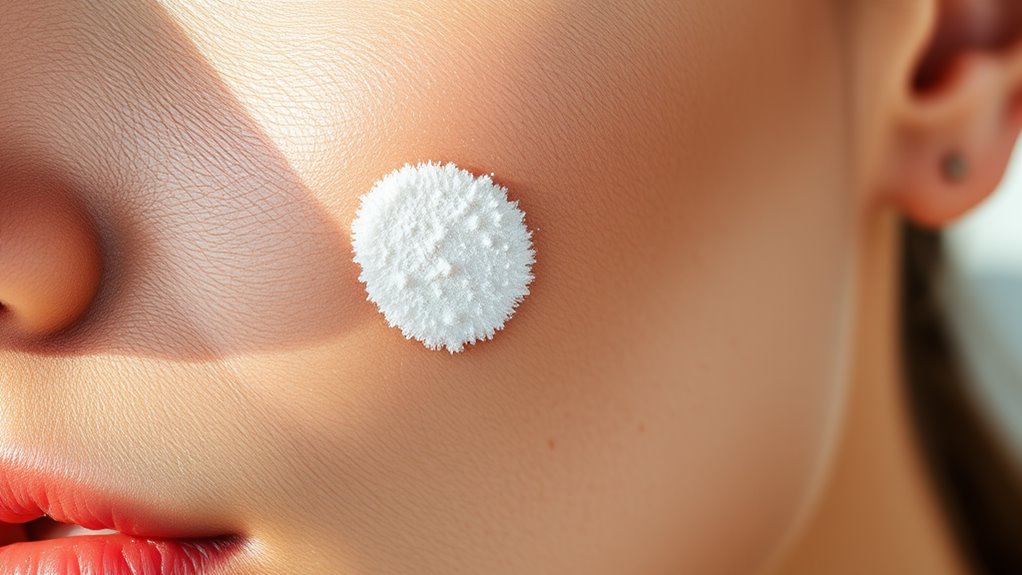Why Your Foundation Looks Flaky-and How Skincare Can Help
If your foundation looks flaky, it’s usually because your skin’s dehydrated from skipping proper hydration or letting dead cells build up, leading to uneven application and caking. You can fix this by double-cleansing first, then using hyaluronic acid serums and ceramides to lock in moisture, while weekly exfoliation smooths rough patches for a flawless base. By adopting these practical steps, you’ll minimize dryness and boost longevity, so keep exploring for more tailored strategies.
Key Takeaways
- Improper product layering or skipping double-cleansing can leave residue, causing foundation to appear flaky.
- Inadequate skin hydration allows foundation to settle into dry patches, resulting in uneven, cakey wear.
- Using hyaluronic acid in your routine boosts moisture levels, helping prevent foundation flakiness.
- Regular exfoliation removes dead skin buildup, creating a smoother surface for better foundation adherence.
- Priming after moisturizing establishes a hydrated base, ensuring even application and reducing flakiness.
Common Causes of Flaky Foundation
Although foundation flakiness can disrupt your flawless look, understanding its common causes lets you tackle them head-on. You might encounter flakiness from improper product layering, where heavy makeup settles unevenly on unprepared skin. Additionally, for individuals with sensitive skin, adopting soothing routines can help maintain skin health and prevent such issues.
If you’re skipping essential skincare tips like double-cleansing before applying foundation, residue builds up and creates a patchy base. Similarly, using oil-based makeup on combination skin traps debris, leading to uneven wear.
To combat this, adopt practical routines: always prime after moisturizing to create a smooth canvas, and select water-based formulas that blend seamlessly. Experiment with tools like damp sponges for even application, ensuring your makeup adheres without caking.
Furthermore, addressing dehydrated skin through proper moisturizing can significantly reduce the occurrence of flaky foundation.
The Impact of Skin Dryness on Makeup
When your skin lacks moisture, it often stems from factors like low humidity or inadequate hydration, leading to a flaky barrier that disrupts makeup adhesion.
You might notice foundation settling into dry patches or caking unevenly, which compromises its smooth application and longevity.
Prioritizing hydration through targeted skincare routines enhances your skin’s texture, allowing foundation to blend seamlessly and last longer. Moreover, skipping moisturizer has been shown to negatively affect skin health by increasing dryness and barrier disruption, based on insights from personal experiences.
Overwashing can strip your skin of its natural oils, disrupting moisture balance and exacerbating dryness.
Skin Dryness Causes
Skin dryness often stems from factors like low humidity, harsh weather, or inadequate hydration, and it directly compromises your makeup by creating a flaky, uneven base that causes products to settle into cracks and wear off prematurely.
Environmental triggers, such as cold winds or heated indoor air, strip your skin’s natural oils, leading to a compromised barrier that amplifies dehydration. Internally, you might overlook dietary deficiencies in essential fatty acids or vitamins, which weaken skin’s moisture retention and exacerbate flaking.
Overuse of stripping cleansers or hot showers further depletes your lipid layer, making foundation adhere poorly and highlight imperfections.
To mitigate this scientifically, monitor your skin’s pH and hydration levels regularly; practical steps include using a humidifier and opting for gentle, emollient-rich routines to maintain a smooth canvas for flawless makeup application.
Foundation Application Problems
Dry skin disrupts foundation application by creating a flaky surface that causes products to cling unevenly, so you’ll notice your makeup settling into fine lines and fading quickly.
This occurs because a dehydrated epidermal barrier disrupts the skin’s natural sebum distribution, leading to patchy coverage and accelerated breakdown of cosmetic layers.
-
Envision foundation caking on dry patches, forming unsightly white specks that highlight texture.
-
Picture uneven pigment distribution, where colors streak across parched areas instead of blending smoothly.
-
See fine lines and pores becoming more pronounced, as makeup clings to dehydrated spots rather than gliding over them.
-
Observe rapid fading, with your foundation wearing off in high-dryness zones, leaving a dull, inconsistent finish.
Hydration Benefits for Makeup
Properly hydrated skin enhances your makeup’s longevity and evenness, counteracting the flaky issues from dryness by strengthening the epidermal barrier and restoring sebum balance.
When your skin lacks moisture, it pulls foundation into cracks, creating an uneven, cakey finish that emphasizes fine lines. You can combat this by incorporating hyaluronic acid serums or ceramide-rich creams into your routine; these lock in hydration, reducing transepidermal water loss and promoting a smooth canvas.
For optimal results, apply a lightweight moisturizer 15 minutes before foundation, allowing it to absorb fully—this prevents pilling and ensures better adhesion.
Scientifically, well-hydrated skin minimizes oxidative stress, helping makeup resist environmental factors like pollution. By prioritizing hydration, you’re not just fixing flakes; you’re building a resilient base for flawless wear all day.
Experiment with pH-balanced products to match your skin type, and watch your foundation perform flawlessly.
Effective Hydration Strategies for Your Skin
While many factors contribute to foundation flakiness, adopting effective hydration strategies can quickly restore your skin’s vitality. To make informed choices, always consider your skin type. By targeting moisture retention, you’ll prevent dryness that disrupts your makeup base.
Focus on science-backed methods to boost your skin’s barrier and hydration levels for a smoother canvas.
-
Envision hyaluronic acid pulling in water molecules, plumping your skin like a well-hydrated sponge for that dewy glow.
-
Picture ceramides reinforcing your skin’s protective layer, locking in moisture to fend off environmental dryness.
-
Imagine a nutrient-rich serum penetrating deeply, delivering hydration straight to thirsty cells for immediate revitalization.
-
Visualize a daily routine with occlusive agents, forming an invisible shield that keeps your skin quenched and resilient.
Incorporate these into your regimen, and you’ll notice foundation applying flawlessly.
Furthermore, boosting your overall hydration by embracing increased water consumption can lead to transformative effects on your skin’s health and appearance.
Exfoliation Methods to Smooth Uneven Texture
Exfoliation plays a key role in smoothing uneven texture, helping your foundation glide on flawlessly by sloughing off dead skin cells.
You can opt for physical methods, like using a soft brush or gentle scrub, which mechanically remove buildup and reveal fresher skin. For instance, incorporate a quick, circular motion with a konjac sponge twice weekly to avoid over-exfoliation and maintain your skin’s barrier.
On the other hand, chemical exfoliation employs alpha-hydroxy acids (AHAs) or beta-hydroxy acids (BHAs) to dissolve dead cells at a cellular level, reducing roughness without abrasion. By avoiding common morning skincare mistakes, you can achieve radiant skin more effectively.
Start with a low-concentration product, applying it once or twice a week, and always follow with moisturizer to prevent dryness. Monitor your skin’s response; if irritation occurs, scale back to ensure safe, effective results.
This targeted approach keeps your complexion even and foundation-ready.
Incorporating these exfoliation tips has helped eliminate common mistakes from my routine, leading to improved skin health and a glowing appearance.
Selecting Skincare Products for Better Foundation Wear
To achieve flawless foundation wear, choose skincare products that match your skin type and address key concerns like hydration or oil control. This ensures your skin acts as a smooth canvas, minimizing flakiness by balancing moisture and sebum levels. Additionally, for acne-prone skin, incorporating effective ingredients can help manage breakouts while supporting overall skin health.
Select ingredients backed by science, such as hyaluronic acid for hydration or niacinamide for texture refinement, to optimize foundation adhesion without overloading your routine.
-
Envision a hydrating serum: Picture it sinking into your skin, plumping fine lines and creating a dewy base that lets foundation melt on evenly.
-
Imagine a mattifying lotion: Feel it absorbing excess oil, leaving a velvety finish that prevents your makeup from sliding off oily zones.
-
Visualize a gentle exfoliating toner: See it buffing away dead cells, revealing a radiant surface where foundation clings flawlessly.
-
Picture a barrier-repair cream: Sense it fortifying your skin’s defenses, locking in hydration to banish dryness and promote long-lasting wear.
For enhanced results, incorporate serum application tips to properly integrate serums into your routine and maximize their benefits for better foundation wear.
Building a Routine for a Flawless Makeup Base
You hydrate your skin first to boost moisture levels and prevent flakiness, setting the stage for even foundation application.
Then, you add a weekly exfoliation routine to gently remove dead cells and promote cell turnover.
This practical strategy optimizes your skin’s texture, ensuring a seamless, long-lasting makeup base. By understanding skincare myths, you can refine your approach for even better results.
Additionally, avoiding skincare mistakes is essential to prevent damage and achieve the best results for your skin.
Hydrate Skin First
Hydrating your skin forms the cornerstone of any flawless makeup routine, as it primes the barrier for better product adhesion and longevity. By boosting your skin’s moisture levels, you’re creating a smooth canvas that minimizes flakiness and enhances foundation’s even application.
Scientifically, this involves restoring the skin’s natural barrier function, which locks in hydration and reduces transepidermal water loss, ensuring your makeup stays put all day.
-
Envision a dewy glow: Picture your skin absorbing a hyaluronic acid serum, plumping fine lines instantly for a velvet-smooth base.
-
Feel the quench: Imagine applying a rich, ceramide-infused moisturizer that seals in water, transforming dry patches into supple, radiant areas.
-
See the barrier strengthen: Visualize hydration sinking in, fortifying your skin’s protective layer against environmental stressors for lasting comfort.
-
Experience makeup magic: Think of your foundation gliding on effortlessly, blending seamlessly without caking, thanks to that hydrated foundation.
Exfoliate Weekly Routine
While maintaining a hydrated base is essential, exfoliating as part of your weekly routine removes dead skin cells, revealing a smoother canvas for flawless makeup application.
Opt for chemical exfoliants like AHAs or BHAs, which dissolve buildup without harsh abrasion, or physical scrubs for gentle mechanical removal—always patch-test first.
Exfoliate once a week, ideally on non-makeup days, to minimize irritation and maintain your skin’s barrier. Follow with a hydrating serum and moisturizer to soothe and protect. This prevents product buildup, reducing foundation flakiness for a seamless finish.
Track your skin’s tolerance; if sensitivity arises, space out sessions. Consistency builds resilience, ensuring makeup glides on evenly and lasts longer.

